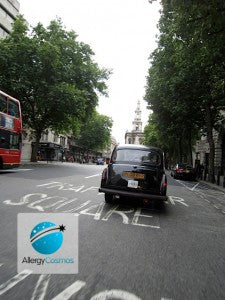London air pollution is a significant cause of ill health and the government, both local and national, are under pressure to clean up the air in the capital. Former Mayor Boris Johnson introduced a number of measures in recent years with the aim of improving the capital's air quality. We have Europe's largest fleet of low emission hybrid buses and tighter emission standards for lorries and vans, while the most polluting taxis have been forced to 'retire'. But these pollution controls are not bold enough, according to Jenny Jones, leader of the Green Party in London.
She has carried out a study that uses the Mayor's office own pollution modelling projections and comes up with the prediction that nearly half of London's roads will still exceed legal limits for nitrogen dioxide pollution. This means that there will be 928 schools within 150 metres of main roads which exceed legal limits on air pollution. This will increase the risk of asthma among children attending these schools and exacerbate the risk of an attack among those who already have the condition. Research has shown that living near roads that have 10,000 or more vehicles travelling on them every day accounts for around 15 to 30 per cent of new cases of asthma among children and of new cases of coronary heart disease and Chronic Obstructive Pulmonary Disease among those aged 65 or more. The study also shows that there will be 8,642 bus stops on roads that are over the limit. Thus, those using public transport to try to cut pollution levels will actually be putting themselves at risk if they are standing at these bus stops.
The Green Party in London is suggesting the following three moves in order to improve air quality in the city as an urgent priority:
- Make walking and cycling safer and more pleasant. Make public transport cheaper.
- Get rid of diesel-fuelled buses altogether and make sure that the total fleet is zero emission (electric or hydrogen fuel cell powered) by 2020.
- Bring forward the plan for an Ultra Low Emission Zone and make sure that only clean vehicles enter central London (the current plan is to introduce this by 2020).




